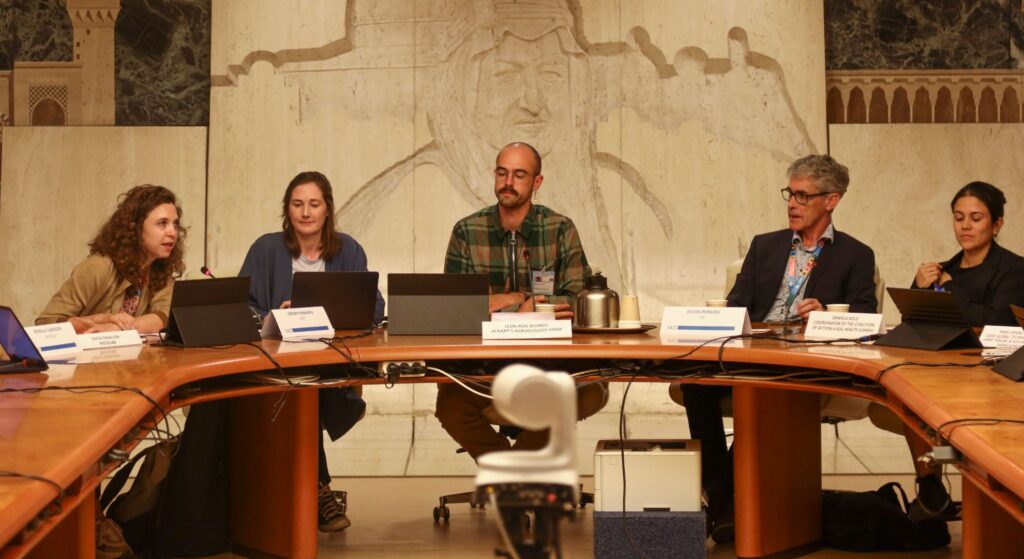In 2024, many of the young partners that SIANI has worked with over the years have both received and provided new opportunities to the network since they engaged with SIANI.
SIANI has worked with youth as key actors in food system transformation for over ten years. Since then, SIANI has documented the longer-term impact of its youth engagement. 2024 was a momentous year when many of these collaborations led to results in a broader sphere.
SIANI supported young partners to attend the World Food Forum
SIANI enabled several young people to be recognised as participants and organisers at the World Food Forum (WFF) flagship event in 2024. SIANI financially supported a student from Alnarp’s Agroecology Farm to attend the forum and present at SIANI’s side event. Following SIANI’s initiative, SLU supported the travel to Rome for seven additional students. Ylva Hillbur, pro vice-chancellor with responsibility for internationalization, doctoral education and Agenda 2030 at SLU also joined the forum. Moreover, Sofia Cavalleri, who has been collaborating with SIANI since 2021, co-organised the WFF event with SIANI through her start-up Ristolab.
FAO references SIANI
By investing in young people who are future actors of change, SIANI has made a significant impact on policy documents. For example, Ebba Engström was previously part of SIANI’s secretariat and has been elected to the Young Scientists Group (YSG) for the World Food Forum 2023-2025, which provides the WFF with science-based direction. Ebba authored YSG’s second report, “Digital technologies for multidimensional youth engagement in agrifood systems transformation.” SIANI was referenced three times in the report, in particular highlighting its involvement of youth in the UN Food Systems Summit process in 2021.
The report did not adopt a systematic approach; however, it highlights key areas for exploration and expresses the need for more structured efforts to gather evidence and best practices, stresses Ebba Engström.
“I do, however, welcome a more systematic approach related to this topic, which aims to collate the evidence of how digital technologies have been used to engage people as part of decision-making processes in agrifood systems!”
The literature review conducted highlights key areas related to the role of digital technologies in youth engagement and presents examples or case studies pertaining to the different dimensions of youth engagement. In this context, SIANI’s discussions in the UNFSS on how digital technologies can enable youth participation in decision-making stood out for their relevance.
Reflecting on her time with SIANI, Engström emphasized how the organisation shaped her perspective on the role of youth in agrifood systems:
“Not only did it allow for me to reflect about youth’s positionality (and as such – my own positionality in being part of the youth demographic) – but it also gave me practical insights as to how to engage youth across agrifood systems, including for them to become part of decision-making processes.”
Ebba, also, pointed to SIANI as a commendable example of how organizations can meaningfully promote youth engagement and empowerment in the context of agrifood systems. Drawing on her experience, she observed that SIANI’S leadership model lifts youth and accredits youth’s contributions accurately. Its communication work promotes opportunities which apply to youth, Importantly, SIANI’s internal culture provides a supportive environment to discuss and reflect over its own work pertaining to youth. As the global conversation around youth engagement and empowerment in the context of agrifood systems continues to evolve, Engström emphasises
“I believe it is timely to assess organisational models (as the one of SIANI) to draw lessons of best practices pertaining to the area.”
Youth businesses grow
This supportive approach has translated into real-world impact. Beyond policy engagement, SIANI has significantly boosted the credibility and confidence of young entrepreneurs. Naol Oli Adugna, a young entrepreneur from Ethiopia, initiated the start-up Beta Blockers to produce nutritious biscuits for children. SIANI has been a valuable partner, collaborating with him on several occasions. Recently, Naol reported that he has established a sales point outside of Addis Ababa. In addition to the nutritious biscuits, the shop sells agroecologically produced vegetables such as tomatoes, potatoes and onions, sourced from local farmers. This approach allows Beta Blockers to provide multiple healthy and affordable food options to the community. Naol highlighted SIANI’s role in his start-up’s journey up until now:
“I have shown every official we faced our video and posts at both the Regional and Annual meetings of SIANI, this has given us credibility and confidence among people”
